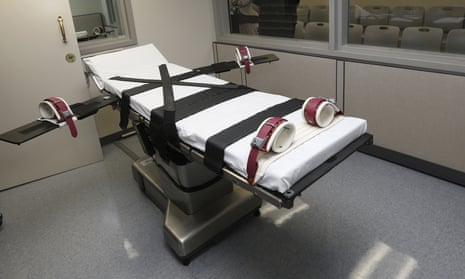Oklahoma is planning to execute a prisoner on death row nearly every month starting in August through 2024 in a move that is likely to cause outrage among opponents of the death penalty.
The Oklahoma court of criminal appeals set the execution dates on Friday for six inmates, who have all exhausted their appeals, and plans for executions to take place about once a month. The inmates’ capital punishments were on hold because of a lawsuit over botched lethal injections, which led to a more than five-year execution moratorium.
In June, a federal judge ruled that the state’s three-drug lethal injection method is constitutional and does not amount to cruel and unusual punishment. After the court ruling, Oklahoma’s attorney general, John O’Connor, asked for more than two dozen executions to be scheduled.
He said in a statement that the six inmates with set execution dates were tried for murder. The most recent of these murders was in 2003, while the earliest case dates back to 1993.
“The family members of these loved ones have waited decades for justice,” said O’Connor. “My office stands beside them as they take this next step in the journey that the murderers forced upon them.”
More than 42 inmates in Oklahoma are sentenced to death, according to the Oklahoma department of corrections. Oklahoma’s current execution protocol involves administering midazolam, vecuronium bromide and potassium chloride to convicted murderers on death row.
In 2021, the state carried out its first execution since the moratorium was put in place, but witnesses said the Oklahoma inmate convulsed and vomited during the capital punishment.
The court issued in June definitive findings of the execution of John Grant, stating it was “unsurprising” that Grant regurgitated during the execution, given that he had a full stomach at the time.
Several men on death row have claims of innocence, and some lawmakers have been looking into the case of Richard Glossip, who was convicted of arranging the murder of a motel owner in 1997.
Oklahoma legislators announced that an independent investigation revealed strong evidence of the innocence of Glossip, who is scheduled for execution in September.
